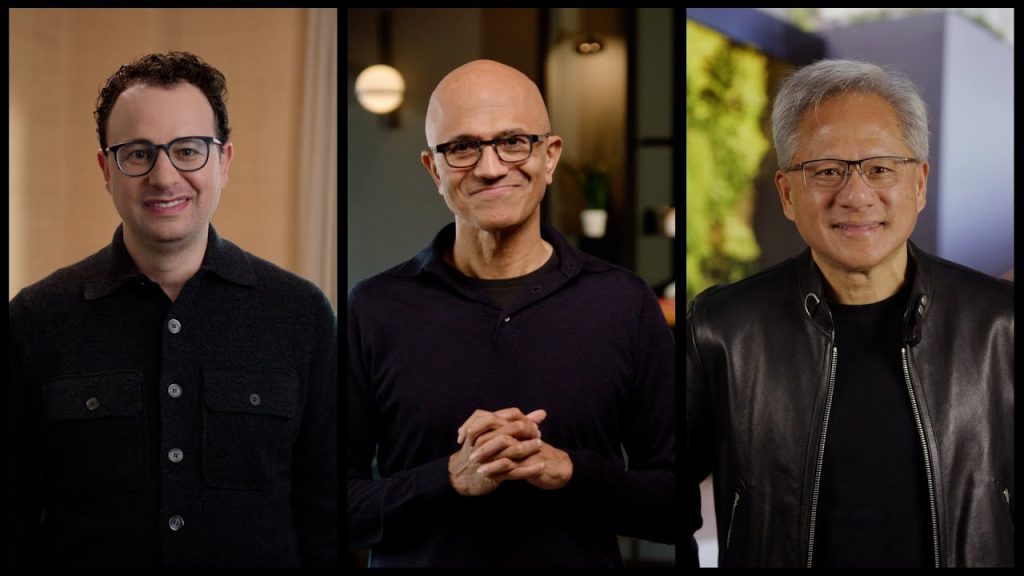Microsoft, Nvidia, and Anthropic Forge Landmark AI Alliance with Multibillion-Dollar Investment
In a stunning development that reshapes the artificial intelligence landscape, Microsoft, Nvidia, and Anthropic have announced a groundbreaking partnership that involves massive financial commitments and technological collaboration. The alliance, revealed Tuesday morning amid the backdrop of Microsoft’s Ignite conference in San Francisco, represents one of the most significant consolidations of power and resources in the rapidly evolving AI industry. Microsoft has committed to a $5 billion investment in Anthropic, creator of the Claude AI assistant, while Nvidia plans to invest up to $10 billion in the startup. In return, Anthropic has pledged to spend at least $30 billion on Microsoft’s Azure cloud platform—a staggering financial commitment that underscores the high-stakes nature of today’s AI race.
This unexpected partnership arrives during what can only be described as a period of frenzied deal-making among tech giants and AI specialists. The alliance appears designed to strengthen each company’s position in different segments of the AI value chain: Microsoft expands its cloud services footprint, Nvidia ensures adoption of its cutting-edge AI hardware, and Anthropic gains the capital and infrastructure needed to develop its next generation of sophisticated AI models. These models, identified as Claude Sonnet 4.5, Claude Opus 4.1, and Claude Haiku 4.5, will be made available to enterprise customers through Microsoft’s Foundry platform, providing businesses with streamlined access to frontier AI capabilities. Additionally, Microsoft has committed to maintaining Claude’s availability across its Copilot ecosystem, including GitHub Copilot, Microsoft 365 Copilot, and Copilot Studio.
What makes this announcement particularly intriguing is how it reshapes existing partnerships and corporate relationships. Anthropic has been closely associated with Amazon, which had previously committed to invest $8 billion in the startup. In an apparent effort to manage potential tension, Anthropic clarified that Amazon remains its “primary cloud provider and training partner” for AI models, suggesting an attempt to maintain that relationship despite the massive new Azure commitment. This delicate balancing act highlights the complex web of alliances forming in the AI sector, where companies simultaneously cooperate and compete across different dimensions of the technology stack. The news follows OpenAI’s recent announcement of a seven-year, $38 billion agreement with Amazon to expand its AI presence on AWS, further complicating the competitive landscape.
The partnership reflects a growing recognition among major AI players that collaboration may be necessary to address the immense computational, financial, and talent requirements of developing cutting-edge AI systems. For Nvidia, the investment ensures that Anthropic’s future models will be optimized for its next-generation Grace Blackwell and Vera Rubin chips—securing a crucial customer for its hardware and strengthening its dominant position in AI computing. Microsoft gains a deeper relationship with a leading AI research lab beyond its primary OpenAI partnership, diversifying its AI portfolio and potentially reducing risk. For Anthropic, founded by former OpenAI researchers, the deal provides critical resources to compete with its larger rival while maintaining its independence—a contrast to OpenAI’s closer structural ties with Microsoft.
Beyond the headline financial figures, this alliance represents a strategic repositioning in how AI capabilities will be delivered to businesses and organizations worldwide. By integrating Anthropic’s models into Microsoft’s widely used enterprise platforms, the partnership potentially accelerates AI adoption across industries. Enterprise customers gain streamlined access to multiple leading AI systems through familiar Microsoft interfaces and infrastructure, reducing the technical barriers to implementation. This integration approach may prove crucial as organizations seek to incorporate AI capabilities without building specialized technical teams or infrastructure—a key consideration as AI moves from experimental technology to business necessity.
The timing of this announcement—during Microsoft’s Ignite conference and amid growing scrutiny of AI development from regulators worldwide—suggests a deliberate effort to demonstrate continued momentum in commercial AI advancement while navigating an increasingly complex regulatory environment. As governments around the world consider frameworks for AI oversight, these major players appear to be consolidating their positions and resources, potentially giving them greater influence in shaping how regulations develop. The partnership also arrives as public discourse increasingly questions whether the rapid advancement of AI technologies serves broader societal interests or primarily benefits a small group of powerful companies. As these three influential technology leaders deepen their collaboration, they will likely face growing pressure to demonstrate how their alliance contributes to responsible innovation that addresses genuine human needs rather than simply accelerating the concentration of technological and economic power.


